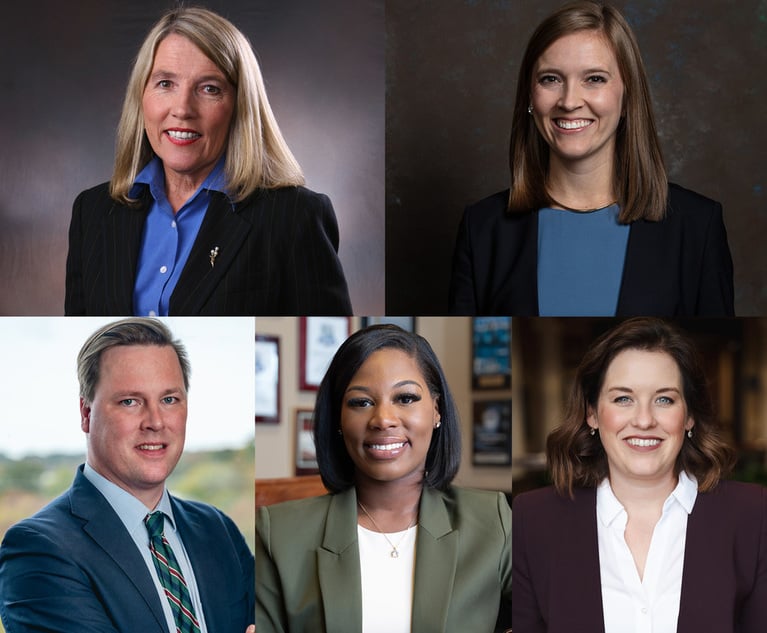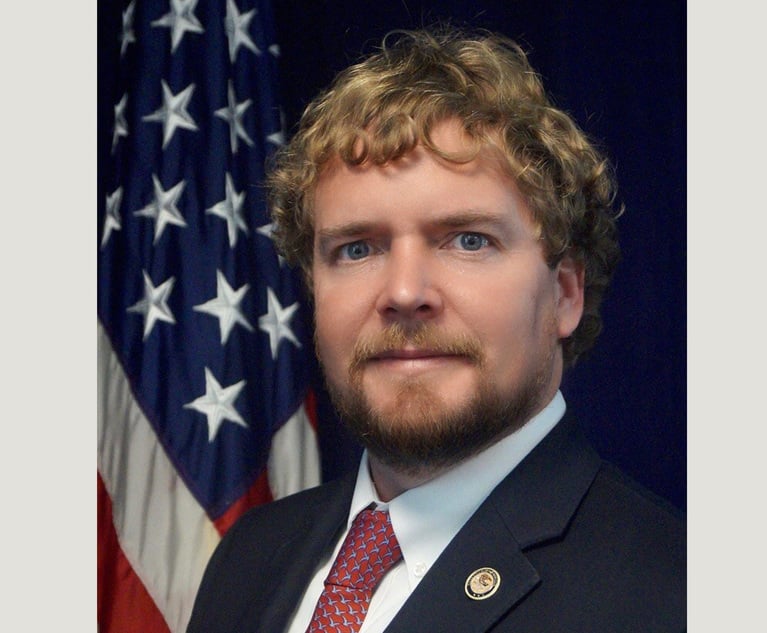 House Majority Leader Chuck Efstration, a Dacula Republican. (Courtesy photo)
House Majority Leader Chuck Efstration, a Dacula Republican. (Courtesy photo) Ga. Lawmakers Push Back on Testifying in Trump Probe
A Georgia judge ruled last year that lawmakers had to testify before a special grand jury in Atlanta about contact with private citizens on former President Donald Trump-related matters, even if those communications were part of legislative duties.
January 12, 2023 at 10:17 AM
4 minute read
NewsGeorgia state lawmakers are pushing back on a state court ruling that forced some of them to testify during an investigation into whether former President Donald Trump and others illegally tried to influence the 2020 election in the state.
The state House and Senate adopted rules Wednesday that say legislative privilege, a legal concept rooted in the U.S. and Georgia constitutions that says lawmakers shouldn't face questioning for activities relating to making laws, should shield communications with people outside the legislature. Most majority Republicans voted in favor and most Democrats voted against.
Crucially, the language is only part of legislative rules. It's not clear if it would hold up in court, and judges nationwide have typically limited sweeping claims of legislative privilege.
A Georgia judge ruled last year that lawmakers had to testify before a special grand jury in Atlanta about contact with private citizens on Trump-related matters, even if those communications were part of legislative duties.
"We can't all be experts on every issue that comes up before us," House Majority Leader Chuck Efstration, a Dacula Republican, said Wednesday during debate. "We rely on others who do have expertise. That communication in order to help us make those determinations would be protected."
But Democrats question whether Republicans are trying to cover up evidence from the period after the 2020 elections, when some GOP lawmakers showcased Trump's false claims of electoral wrongdoing in Georgia.
"Are we trying to protect that because of some of the issues in elections that came up with elections?" asked Senate Minority Whip Harold Jones II, an Augusta Democrat.
Fulton County Superior Court Judge Robert McBurney ruled in July that lawmakers have broad immunity but could be asked about their conversations with people outside the legislature. Lawmakers had argued that they should be entirely immune from testifying.
At the time of McBurney's ruling, Fulton County District Attorney Fani Willis said there was evidence that testimony given before legislative committees in December 2020 by Trump attorney Rudy Giuliani and others "was part of a multistate, coordinated plan by the Trump campaign to influence the results of the November 2020 election in Georgia and elsewhere."
Fred Smith, a constitutional law professor at Emory University in Atlanta, said district attorneys have powers that must be respected, too.
"It's hard to imagine that a state legislative rule could kind of trump a DA's ability to engage in their own state constitutional responsibilities, up to the line provided for in the Constitution," Smith said.
McBurney ruled that the grand jury couldn't ask questions about communications between lawmakers, or with legislative staff members, finding those conversations were immune because of legislative privilege.
But he found that such immunity "ought not to be a shield that benefits those outside individuals or otherwise obscures from the grand jury's view the full scope of the alleged efforts to subvert Georgia's elections."
The special grand jury has since finished its work. McBurney dissolved the panel Monday and has scheduled a Jan. 24 hearing to decide whether all or part of the report should be made public.
Willis now must decide whether she will seek indictments from a regular grand jury against Trump or anyone else. The lengthy investigation has been one of several across the country that threaten legal peril for Trump as he mounts a third bid for the White House.
Democrats this week also questioned a provision that suggests one Georgia lawmaker might be able to block another lawmaker from testifying if the first lawmaker refused to allow colleagues to talk about private conversations.
"If you and your colleague to your right or left are having a conversation about a piece of legislation, you would have immunity as well as the colleague you're talking to," Senate Majority Leader Steve Gooch, a Dahlonega Republican, said Monday. "And so you would not be able to reveal the conversation that you and she are having without jeopardizing the immunity that that senator also enjoys."
Because lawmakers are exempt from state open records requirements to produce their own written communications, it's likely that written and oral communications would come out only in litigation. Efstration said written communications with executive branch agencies would still be subject to open records laws.
Both chambers approved the language as part of a larger set of rules routinely adopted at the beginning of each two-year session of the Georgia General Assembly.
Jeff Amy reports for The Associated Press.
NOT FOR REPRINT
© 2025 ALM Global, LLC, All Rights Reserved. Request academic re-use from www.copyright.com. All other uses, submit a request to [email protected]. For more information visit Asset & Logo Licensing.
You Might Like
View All
'Didn't Notice Patient Wasn't Breathing': $13.7M Verdict Against Anesthesiologists
12 minute read

Trending Stories
- 1'Something Else Is Coming': DOGE Established, but With Limited Scope
- 2Polsinelli Picks Up Corporate Health Care Partner From Greenberg Traurig in LA
- 3Kirkland Lands in Phila., but Rate Pressure May Limit the High-Flying Firm's Growth Prospects
- 4Davis Wright Tremaine Turns to Gen AI To Teach Its Associates Legal Writing
- 5'Battle of the Experts': Bridgeport Jury Awards Defense Verdict to Stamford Hospital
Who Got The Work
J. Brugh Lower of Gibbons has entered an appearance for industrial equipment supplier Devco Corporation in a pending trademark infringement lawsuit. The suit, accusing the defendant of selling knock-off Graco products, was filed Dec. 18 in New Jersey District Court by Rivkin Radler on behalf of Graco Inc. and Graco Minnesota. The case, assigned to U.S. District Judge Zahid N. Quraishi, is 3:24-cv-11294, Graco Inc. et al v. Devco Corporation.
Who Got The Work
Rebecca Maller-Stein and Kent A. Yalowitz of Arnold & Porter Kaye Scholer have entered their appearances for Hanaco Venture Capital and its executives, Lior Prosor and David Frankel, in a pending securities lawsuit. The action, filed on Dec. 24 in New York Southern District Court by Zell, Aron & Co. on behalf of Goldeneye Advisors, accuses the defendants of negligently and fraudulently managing the plaintiff's $1 million investment. The case, assigned to U.S. District Judge Vernon S. Broderick, is 1:24-cv-09918, Goldeneye Advisors, LLC v. Hanaco Venture Capital, Ltd. et al.
Who Got The Work
Attorneys from A&O Shearman has stepped in as defense counsel for Toronto-Dominion Bank and other defendants in a pending securities class action. The suit, filed Dec. 11 in New York Southern District Court by Bleichmar Fonti & Auld, accuses the defendants of concealing the bank's 'pervasive' deficiencies in regards to its compliance with the Bank Secrecy Act and the quality of its anti-money laundering controls. The case, assigned to U.S. District Judge Arun Subramanian, is 1:24-cv-09445, Gonzalez v. The Toronto-Dominion Bank et al.
Who Got The Work
Crown Castle International, a Pennsylvania company providing shared communications infrastructure, has turned to Luke D. Wolf of Gordon Rees Scully Mansukhani to fend off a pending breach-of-contract lawsuit. The court action, filed Nov. 25 in Michigan Eastern District Court by Hooper Hathaway PC on behalf of The Town Residences LLC, accuses Crown Castle of failing to transfer approximately $30,000 in utility payments from T-Mobile in breach of a roof-top lease and assignment agreement. The case, assigned to U.S. District Judge Susan K. Declercq, is 2:24-cv-13131, The Town Residences LLC v. T-Mobile US, Inc. et al.
Who Got The Work
Wilfred P. Coronato and Daniel M. Schwartz of McCarter & English have stepped in as defense counsel to Electrolux Home Products Inc. in a pending product liability lawsuit. The court action, filed Nov. 26 in New York Eastern District Court by Poulos Lopiccolo PC and Nagel Rice LLP on behalf of David Stern, alleges that the defendant's refrigerators’ drawers and shelving repeatedly break and fall apart within months after purchase. The case, assigned to U.S. District Judge Joan M. Azrack, is 2:24-cv-08204, Stern v. Electrolux Home Products, Inc.
Featured Firms
Law Offices of Gary Martin Hays & Associates, P.C.
(470) 294-1674
Law Offices of Mark E. Salomone
(857) 444-6468
Smith & Hassler
(713) 739-1250







